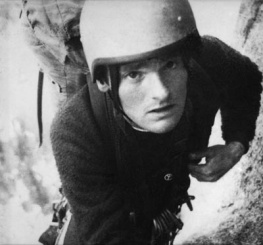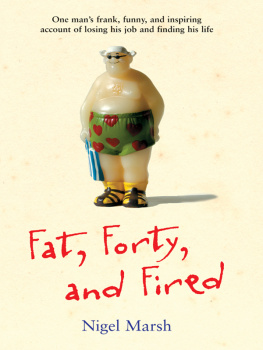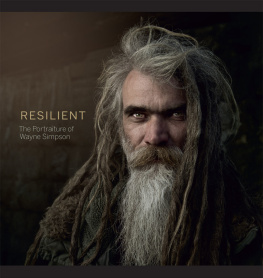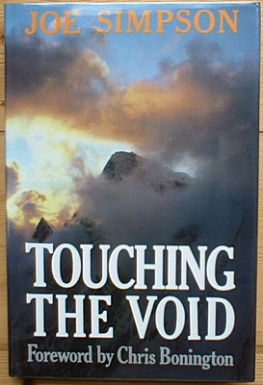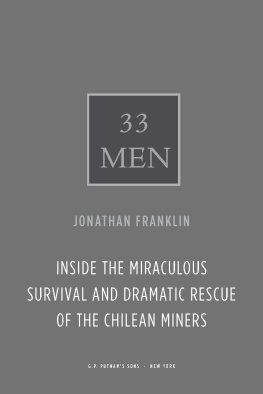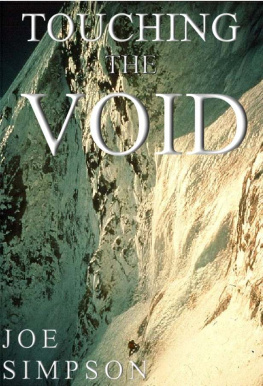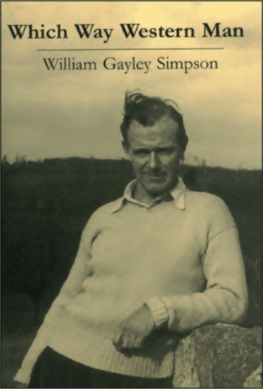Joe Simpson - Touching the Void: The Harrowing First Person Account of One Mans Miraculous Survival
Here you can read online Joe Simpson - Touching the Void: The Harrowing First Person Account of One Mans Miraculous Survival full text of the book (entire story) in english for free. Download pdf and epub, get meaning, cover and reviews about this ebook. year: 1989, publisher: Perennial, genre: Science. Description of the work, (preface) as well as reviews are available. Best literature library LitArk.com created for fans of good reading and offers a wide selection of genres:
Romance novel
Science fiction
Adventure
Detective
Science
History
Home and family
Prose
Art
Politics
Computer
Non-fiction
Religion
Business
Children
Humor
Choose a favorite category and find really read worthwhile books. Enjoy immersion in the world of imagination, feel the emotions of the characters or learn something new for yourself, make an fascinating discovery.

- Book:Touching the Void: The Harrowing First Person Account of One Mans Miraculous Survival
- Author:
- Publisher:Perennial
- Genre:
- Year:1989
- Rating:4 / 5
- Favourites:Add to favourites
- Your mark:
- 80
- 1
- 2
- 3
- 4
- 5
Touching the Void: The Harrowing First Person Account of One Mans Miraculous Survival: summary, description and annotation
We offer to read an annotation, description, summary or preface (depends on what the author of the book "Touching the Void: The Harrowing First Person Account of One Mans Miraculous Survival" wrote himself). If you haven't found the necessary information about the book — write in the comments, we will try to find it.
Joe Simpson: author's other books
Who wrote Touching the Void: The Harrowing First Person Account of One Mans Miraculous Survival? Find out the surname, the name of the author of the book and a list of all author's works by series.
Touching the Void: The Harrowing First Person Account of One Mans Miraculous Survival — read online for free the complete book (whole text) full work
Below is the text of the book, divided by pages. System saving the place of the last page read, allows you to conveniently read the book "Touching the Void: The Harrowing First Person Account of One Mans Miraculous Survival" online for free, without having to search again every time where you left off. Put a bookmark, and you can go to the page where you finished reading at any time.
Font size:
Interval:
Bookmark:
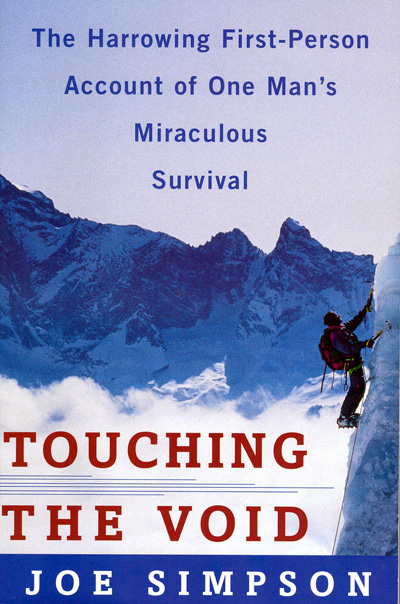 |
Joe Simpson
Touching the Void
1988
An account of the ascent of the 21,000ft Siula Grande peak in the Peruvian Andes. Joe Simpson and his climbing partner, Simon Yates, had achieved the summit before the first disaster struck. What happened and how they dealt with the psychological traumas that resulted is the subject of this book.
by Chris Bonington
I first met Joe in Chamonix last winter. Like many climbers he had decided it was time to learn to ski, had no intention of taking formal lessons and was teaching himself. I had heard and read stories about him, of desperately narrow escapes on the mountains, particularly his latest escapade in Peru, but they had made only a limited impact.
Sitting beside him in a bar in Chamonix it was difficult putting the stories and reputation to the person. He was dark, with a slightly punk hairstyle, and there was something abrasive in his manner. I found it difficult to take him in my mind from the streets of Sheffield into the mountains. And I didnt think much more about him until I read the manuscript of Touching the Void. It wasnt just the remarkable nature of the storyand it was remarkable, one of the most incredible stories of survival that I have ever readit was the quality of the writing that was both sensitive and dramatic, capturing the extremes of fear, suffering and emotion both of himself and his partner, Simon Yates. From the moment Joe slipped and fell, breaking his leg on the descent, through his solitary agony in the crevasse until the moment he crawled into their base camp, I was riveted, unable to put the book down.
To put Joes struggle for survival in perspective, I can compare it to my own experience on the Ogre in 1977, when Doug Scott slipped whilst abseiling from the summit and broke both legs. At this stage the situation was similar to the early part of Joes ordeal. There were just two of us near the top of a particularly inhospitable mountain. But for us there were two other team members in a snow cave on the col just below the summit block. We were caught by a storm and took six days, five of them without food, to get down. On the way I slipped and broke my ribs. It was the worst experience I have ever had in the mountains and yet, compared to what Joe Simpson went through on his own, it begins to pale.
A close parallel happened on Haramosh in the Karakoram in 1957. It was an Oxford University party trying to make the first ascent of this 24,270 foot peak. They had just decided to turn back; two of the members, Bernard Jillot and John Emery, wanted to go just a little farther on the ridge to get photographs and were swept away in a wind slab avalanche. They survived the fall and their team mates went down to rescue them, but this was only the start of a long-drawn-out catastrophe, from which only two emerged alive.
Theirs, too, was an intriguing and very moving story but it was told by a professional writer and, because of this, lacks the immediacy and strength of someone writing at first hand. This is where Joe Simpson scores. Not only is it one of the most incredible survival stories of which I have heard, it is superbly and poignantly told and deserves to become a classic in this genre.
February 1988
All men dream: but not equally.
Those who dream by night in the dusty recesses of their minds wake in the day to find that it was vanity: but the dreamers of the day are dangerous men, for they may act their dreams with open eyes, to make it possible.
T.E. Lawrence, The Seven Pillars of Wisdom
Beneath the Mountain Lakes
I was lying in my sleeping bag, staring at the light filtering through the red and green fabric of the dome tent. Simon was snoring loudly, occasionally twitching in his dream world. We could have been anywhere. There is a peculiar anonymity about being in tents. Once the zip is closed and the outside world barred from sight, all sense of location disappears. Scotland, the French Alps, the Karakoram, it was always the same. The sounds of rustling, of fabric flapping in the wind, or of rainfall, the feel of hard lumps under the ground sheet, the smell of rancid socks and sweatthese are universals, as comforting as the warmth of the down sleeping bag.
Outside, in a lightening sky, the peaks would be catching the first of the morning sun, with perhaps even a condor cresting the thermals above the tent. That wasnt too fanciful either since I had seen one circling the camp the previous afternoon. We were in the middle of the Cordillera Huayhuash, in the Peruvian Andes, separated from the nearest village by twenty-eight miles of rough walking, and surrounded by the most spectacular ring of ice mountains I had ever seen, and the only indication of this from within our tent was the regular roaring of avalanches falling off Cerro Sarapo.
I felt a homely affection for the warm security of the tent, and reluctantly wormed out of my bag to face the prospect of lighting the stove. It had snowed a little during the night, and the grass crunched frostily under my feet as I padded over to the cooking rock. There was no sign of Richard stirring as I passed his tiny one-man tent, half collapsed and whitened with hoar frost. Squatting under the lee of the huge overhanging boulder that had become our kitchen, I relished this moment when I could be entirely alone. I fiddled with the petrol stove which was mulishly objecting to both the temperature and the rusty petrol with which I had filled it. I resorted to brutal coercion when coaxing failed and sat it atop a propane gas stove going full blast. It burst into vigorous life, spluttering out two-foot-high flames in petulant revolt against the dirty petrol. As the pan of water slowly heated, I looked around at the wide, dry and rock-strewn river bed, the erratic boulder under which I crouched marking the site at a distance in all but the very worst weather. A huge, almost vertical wall of ice and snow soared upwards to the summit of Cerro Sarapo directly in front of the camp, no more than a mile and a half away. Rising from the sea of moraine to my left, two spectacular and extravagant castles of sugar icing, Yerupaja and Rasac, dominated the camp site. The majestic 21,000-foot Siula Grande lay behind Sarapo and was not visible. It had been climbed for the first time in 1936 by two bold Germans via the North Ridge. There had been few ascents since then, and the true prize, the daunting 4,500-foot West Face had so far defeated all attempts.
I turned off the stove and gingerly slopped the water into three large mugs. The sun hadnt cleared the ridge of mountains opposite and it was still chilly in the shadows.
Theres a brew ready, if youre still alive in there, I announced cheerfully.
I gave Richards tent a good kicking to knock off the frost and he crawled out looking cramped and cold. Without a word he headed straight for the river bed, clutching a roll of toilet paper. Are you still bad? I asked when he returned.
Well, Im not the full ticket but I reckon Im over the worst. It was bloody freezing last night. I wondered if it was the altitude rather than the kidney-bean stew that was getting to him. Our tents were pitched at 15,000 feet, and he was no mountaineer.
Simon and I had found Richard resting in a sleazy hotel in Lima, halfway through his six-month exploration of South America. His wire-rimmed glasses, neat practical clothing and bird-like mannerisms hid a dry humour and a wild repertoire of beachcombing reminiscences. He had lived off grubs and berries with pygmies while dug-out canoeing through the rain forests of Zaire, and had watched a shoplifter being kicked to death in a Nairobi market. His travelling companion was shot dead by trigger-happy soldiers in Uganda for no more than a dubious exchange of cassette tapes.
Font size:
Interval:
Bookmark:
Similar books «Touching the Void: The Harrowing First Person Account of One Mans Miraculous Survival»
Look at similar books to Touching the Void: The Harrowing First Person Account of One Mans Miraculous Survival. We have selected literature similar in name and meaning in the hope of providing readers with more options to find new, interesting, not yet read works.
Discussion, reviews of the book Touching the Void: The Harrowing First Person Account of One Mans Miraculous Survival and just readers' own opinions. Leave your comments, write what you think about the work, its meaning or the main characters. Specify what exactly you liked and what you didn't like, and why you think so.

